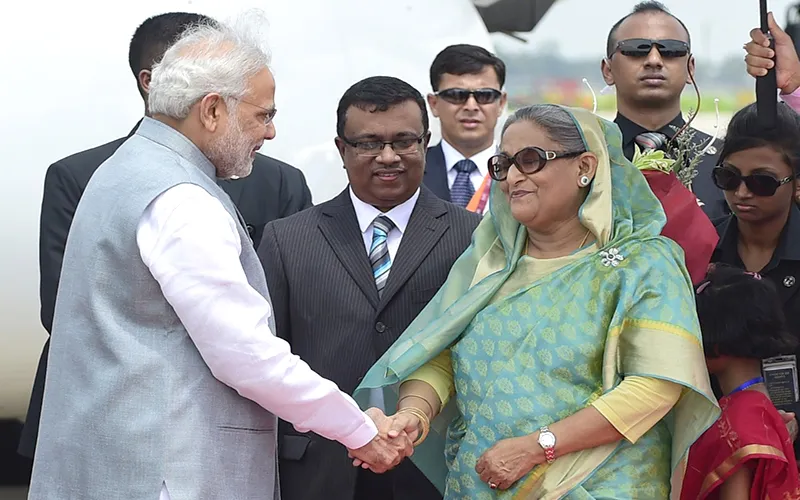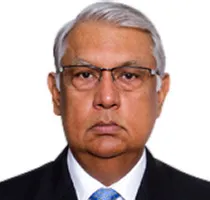-
CENTRES
Progammes & Centres
Location
Bangladesh and India are standing at a take-off stage in their relationship despite anti-Indian groups and political parties trying to find fault with Hasina's moves. The Chinese and Pakistani lobbies are unhappy with this growing engagement.

The select and mixed audience comprising members of the Bangladeshi elite and Indian expatriates, gathered at the Chinese-built Bangabandhu International Convention Centre (BICC) in Dhaka, did not go home disappointed. Narendra Modi's public address was the last event of his recent visit to Bangladesh. His reputation as an orator had preceded him and ensured a packed hall. He held the audience spell-bound with rhetorical flourishes, fulsome praise for Bangladesh's impressive successes in the economic, social and health sectors and the vision of the two nations marching in lock step, "Saath Saath". Knowing the public pulse, Modi even lauded Bangladesh's rise as a cricketing nation amidst roars of approval.
Emphasising that both countries have to single-mindedly devote their energies in realising the aspirations of their peoples, 65% of whom were below the age of 30, Modi directed his appeal towards the next generation of Bangladeshis. By saying a few words in Bengali and invoking the famous lines penned by Jibananda Das about returning again to this part of "Bangla", Modi ensured he won many hearts in a country that has built its national identity on the Bengali language and culture and fought a bloody war of liberation from their genocidal Pakistani oppressors to defend this identity.
In his remarkable public address, Modi also took a swipe at Pakistan, without mentioning it by name, making it clear that India had decided to forge ahead with other neighbours in various aspects of sub-regional cooperation involving Bangladesh, Bhutan, India, Nepal and also bringing in Myanmar at some stage. Predictably, Pakistan has objected to Modi's use of the word "nuisance", describing Pakistan's persistent attempts to use terrorism against India. The sullen Pakistani reaction is par for the course.
This much-awaited visit to Bangladesh was rich in protocol, symbolism and firmly grounded in building sustainable ties. The slew of agreements signed-22 in all-and the joint declaration aptly titled "Notun Projonmo-Nayi Disha" (New Generation-New Direction) are a fitting testimony to a highly successful visit. The only sour note was the inability of the Modi government to deliver on the Teesta water sharing agreement. This disappointment was tempered by the presence of West Bengal chief minister Mamata Banerjee to participate in the talks, be present at the signing of the Land Boundary Agreement (LBA) and the joint flagging of two buses that will operate on the new routes, Agartala-Dhaka-Kolkata and Guwahati-Shillong-Dhaka. Both prime minister Sheikh Hasina and Modi have made overtures to Mamata and the LBA is partly a result of their wooing the mercurial chief minister. She has leveraged her approval to the LBA for a substantial transfer of funds from the Centre, for the rehabilitation of people who will be displaced from enclaves and adverse possessions when the LBA is implemented. Hasina made sure Mamata was received in Dhaka with protocol befitting a head of government and speaking to her over telephone to welcome her personally. She also went out of her way to receive and see off Modi at the airport and make sure there were no deficiencies in extending a red carpet welcome.
Mamata's dilemma was captured by her decision not to travel with Modi and not to stay in the same hotel as the prime minister. She has to contend with opposition to the water sharing formula in her state and keep an eye on Assembly elections in 2016. Modi, therefore, had no option but to return after promising to reach a fair water sharing agreement with the cooperation of all parties.
Cooperation with Bangladesh has been facilitated by the courageous and visionary leadership of Sheikh Hasina ever since she came to power in 2009. She moved decisively against Indian insurgent groups operating out of Bangladesh, captured and handed over their leaders to India and cracked down on homegrown radical and terror outfits. She took these bold steps in the full knowledge that she would be targeted by the extremists who receive support from Pakistan and some oil-rich countries in the Gulf. She has been supported by the younger generation of Bangladeshis who have called for justice and bringing to book those accused of war crimes during the War of Liberation. She has also prosecuted pro-Pakistani officials who were charged with gun-running, in collaboration with the ISI to supply to Indian insurgent groups. This cooperation has been vital in bringing peace to the northeastern states, though the recent ambush and killings of Indian Army personnel in Manipur show that insurgents have regrouped in Myanmar. The Army's cross-border counterstrike eliminating two insurgent camps within Myanmar will send a strong message to the groups and their patrons that there will be retaliation for egregious assaults.
Bangladesh's geostrategic significance on India's eastern flank is obvious. India's Northeast will benefit greatly if multi-modal connectivity is restored and new ones built. Railways, waterways and roads to some extent will be the arteries of trade and movement of people. Such movement will reduce transportation costs and help earn revenue and create jobs in Bangladesh. Agreements on coastal shipping links, use of Chittagong and Mongla ports, renewal of the Inland Water Trade and Transit Treaty will ease flow of goods.
New areas of cooperation in energy, services like insurance, exclusive special economic zones, climate change mitigation projects, a pipeline for supplying petroleum products from Assam-based Numaligarh refinery are now on the menu of bilateral engagement. Connectivity between the two countries remains the focus with a USD 2 billion Line of Credit that will be deployed to upgrade railways, waterways and roads. The primary emphasis will be on railways and waterways that constitute the main arteries of movement of goods at competitive costs.
The bilateral road map will be dominated by water sharing arrangements of the 54 common rivers for which Bangladesh is the lower riparian. Deliberations on the Teesta and the Feni are ongoing. The water issue has already become a carping point in Bangladesh with the opposition and media homing in on Teesta. The same old hackneyed argument about Hasina giving away everything to India and not getting anything in return has started doing the rounds.
Bangladesh and India are standing at a take-off stage in their relationship despite anti-Indian groups and political parties trying to find fault with Hasina's moves. The Chinese and Pakistani lobbies are unhappy with this growing engagement. The official Chinese news agency, Xinhua, chose to comment that Modi had left Bangladesh "thirsty" by not delivering on the Teesta agreement. China's bids to dam and divert rivers for which Bangladesh and India are lower riparian nations mark the high point of Chinese amnesia and hypocrisy. It complains about Indo-Vietnam collaboration in exploration for offshore oil in Vietnamese waters, claiming ownership over them. China has demanded that India take China's permission for exploration. China should, by the same logic, seek India's permission for executing projects in PoK. The China-Pak axis targets both Bangladesh and India, and there will be efforts to derail this growing relationship. Hasina and Modi are, no doubt, aware of such pitfalls.
(The writer is a Distinguished Fellow at Observer Research Foundation, Delhi and a former Indian High Commissioner to Bangladesh)
Courtesy: The New Indian Express, June 11, 2015
The views expressed above belong to the author(s). ORF research and analyses now available on Telegram! Click here to access our curated content — blogs, longforms and interviews.

Pinak Chakravarty was a Visiting Fellow with ORF's Regional Studies Initiative where he oversees the West Asia Initiative Bangladesh and selected ASEAN-related issues. He joined ...
Read More +